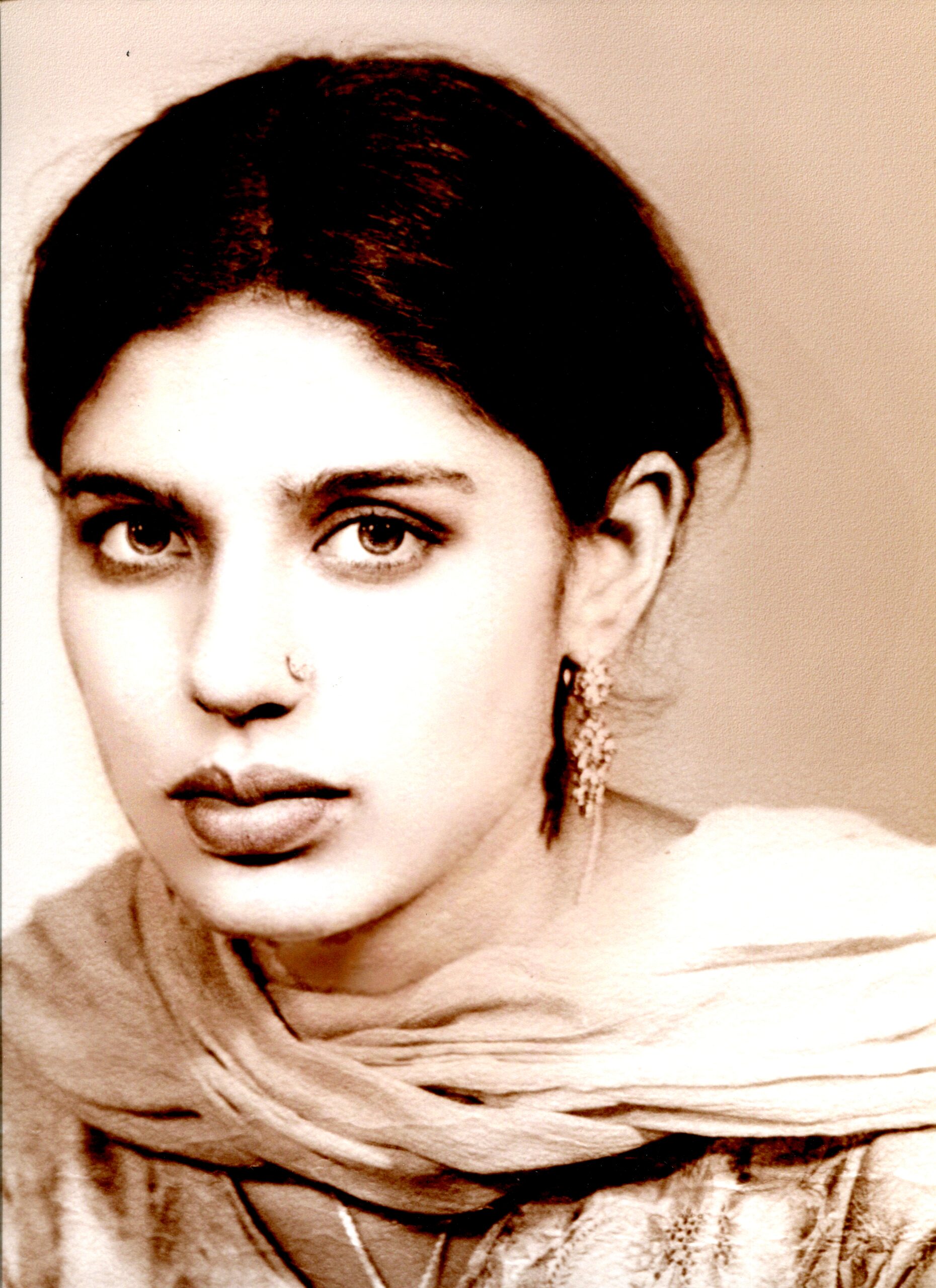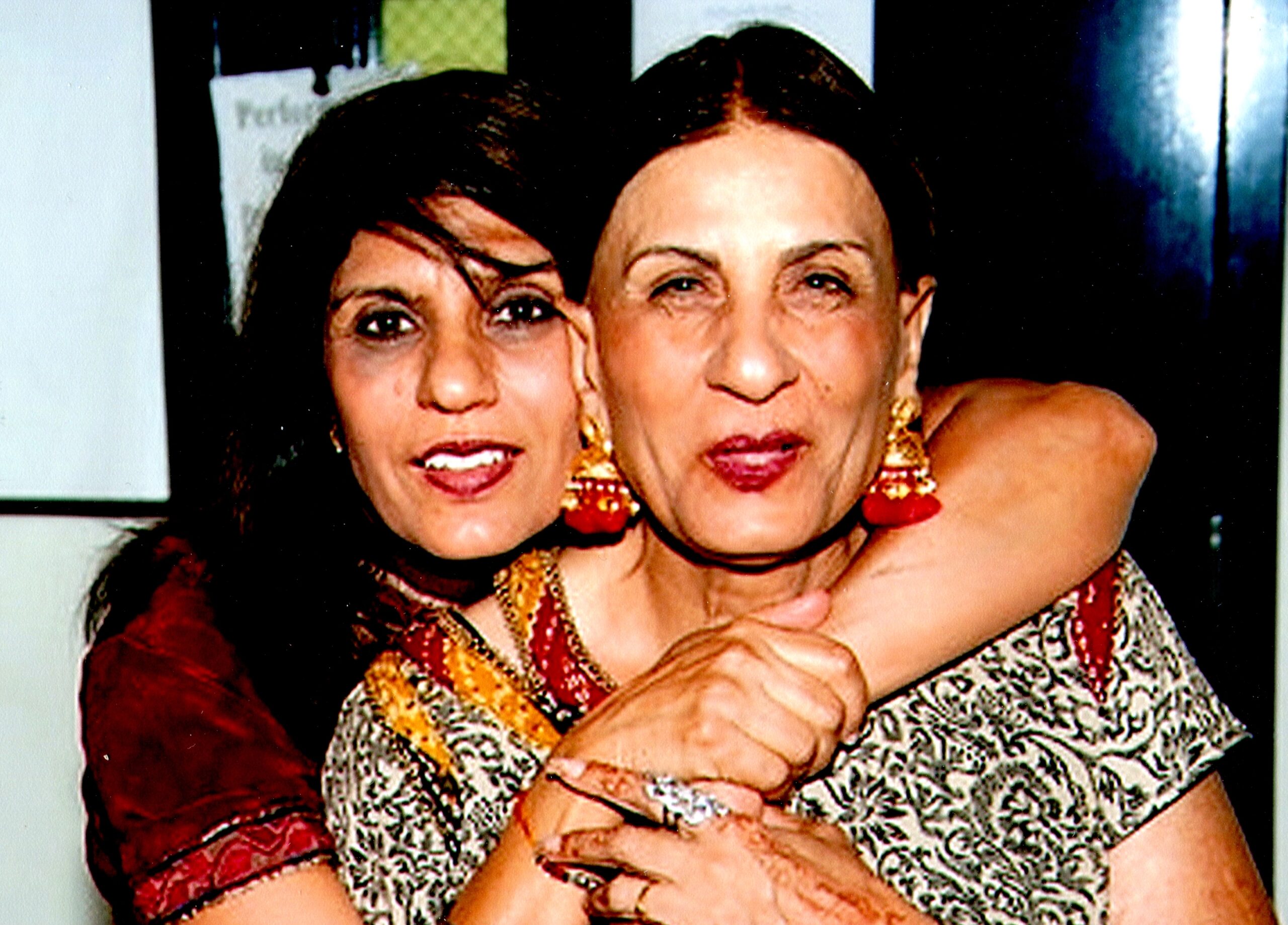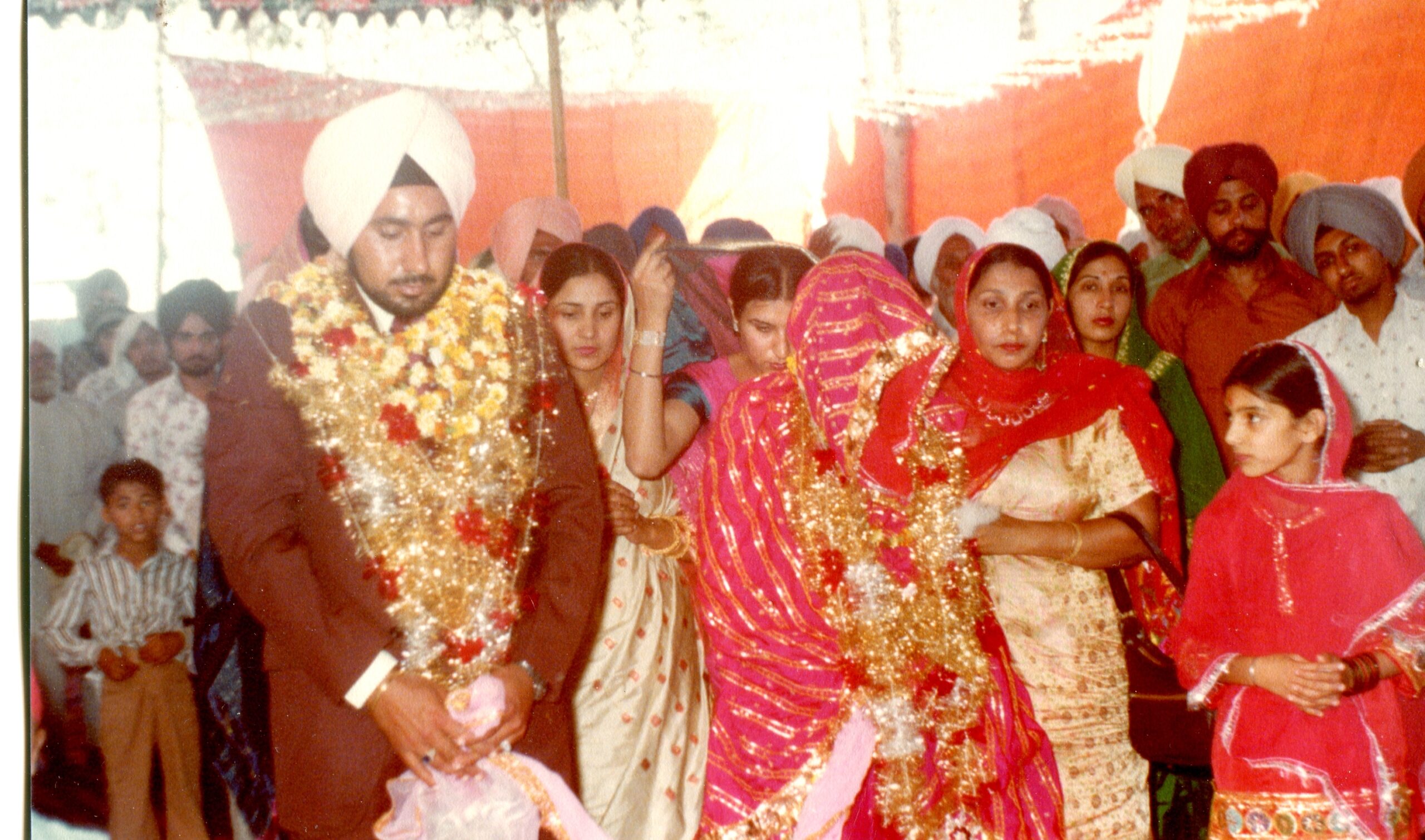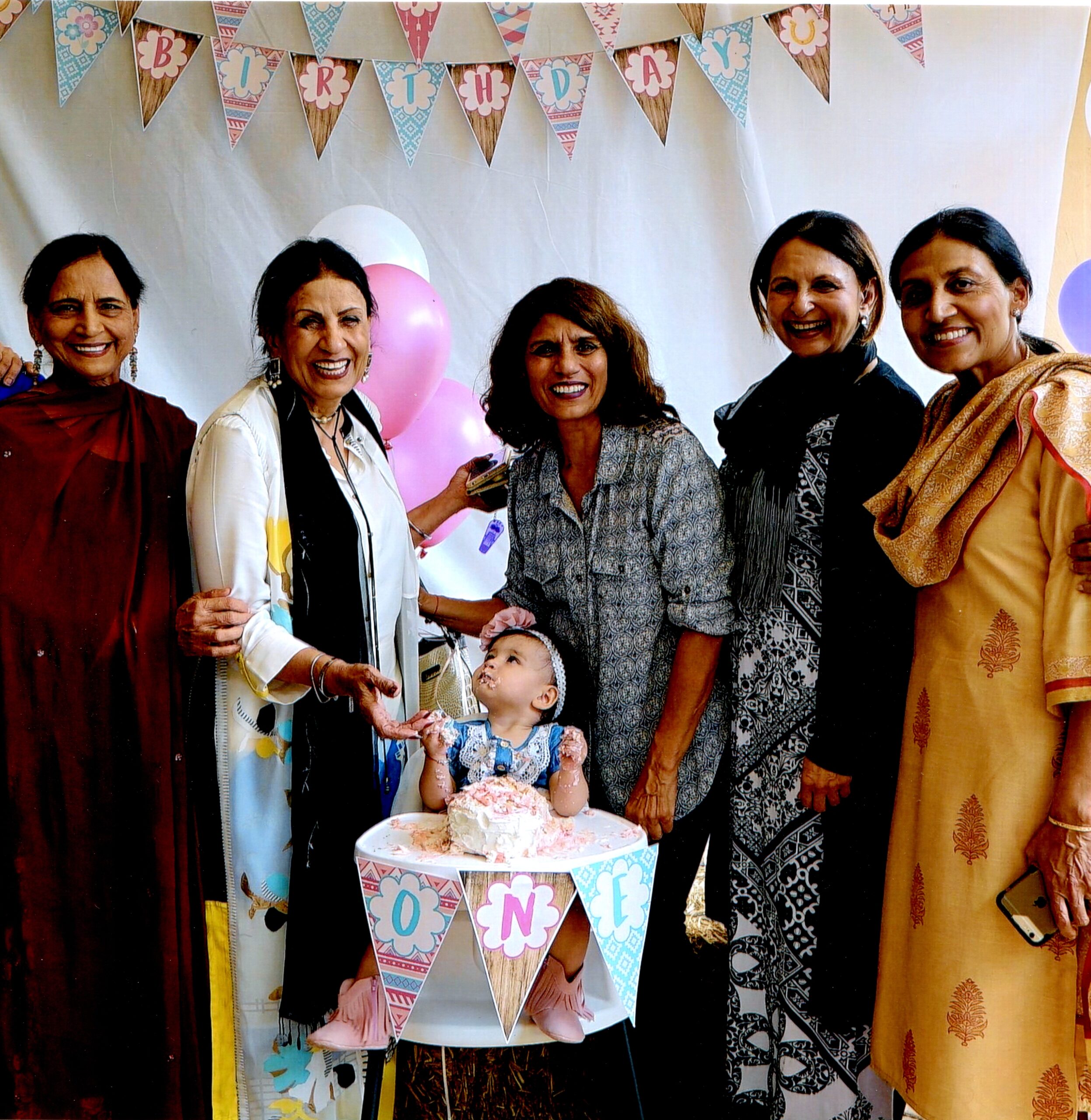Guddi Kaur Ranu
Sharanjit Kaur Ranu (born on March 31, 1955) is affectionately known as Guddi within her broad circle of family and friends. Guddi (doll) is a loving nickname given to girls in Punjabi families. Guddi and her best friend, Guddi Sidhu, created a wide array of Punjabi and Sikh organizations in Fresno, together with other like-minded people. She dedicated herself to teaching the Punjabi language and the Sikh faith to young Sikh-American children. She is also an outspoken advocate for women’s and children’s rights.
Born in a village in Punjab, India, Guddi recalls growing up in two worlds – the city and the pind (village). She shared a nuanced understanding of the complexities of growing up as a girl in Punjab in the 1960s. On the one hand, she recalls that her Nani ji (maternal grandmother) did not welcome her birth due to her gender. In fact, her grandmother was so visibly upset that Guddi’s maternal uncle inquired nervously to other family members: “Is everything all right? Did the delivery go okay? Is the baby okay?” When Guddi’s uncle realized why his mother was so sad, he laughed and told his mother she should be happy that a healthy baby was born.
By contrast, Guddi’s mother was “very, very adamant” that all of her children receive an excellent education. “I owe my education to my mom,” Guddi recalls: “She left the village to the city just for our education because in villages there weren’t very good schools when I was growing up.” During the school year, Guddi, her mother and her brothers lived in the city. They returned to the village to see their father during school holidays. Her mother’s dedication to her children’s education took a toll on her husband’s health. Her husband, who was widely known for his social work, descended into alcoholism in his family’s absence.

Guddi Ranu, Punjab, 1978.
At her mother’s bhog (funeral) in Punjab in 2018, Guddi insisted on “pay[ing] tribute to my mother in front of everybody.” It was unusual for family members, especially women, to speak at funerals in rural Punjab. Guddi spoke publicly of her admiration for her mother’s patience, acceptance, and determination. As a result of her mother’s great efforts, Guddi and her brothers all pursued higher education. Guddi completed her Master’s degree in Sikh history from Punjabi University.
When she was 23 years old, Guddi’s marriage was arranged within the span of just one week. Guddi recalls: “I still remember he saw me on the ninth of April and we got married on the sixteenth of April.” The trauma of such a rushed match with a stranger who lived in America is still somewhat raw for Guddi. Her parents were impressed that her potential husband, Gurdeep Singh Ranu, was a medical doctor in America. This was a highly coveted match for their daughter. Much later, Guddi asked her husband why he chose her over so many other girls: “I saw you. You were tall and fair, so I said yes.” But Guddi still carries powerful emotions about not being consulted on the match:
He [Gurdeep] just saw me and that was it…. I had no say at all… When my parents came and told me, I started crying because
I never liked doctors… I never wanted to come to America but no one asked me, ‘What is your opinion? How do you feel about this?’
A week after being presented to her future husband, Guddi and Gurdeep married in Punjab on April 16, 1978. Six months later, she joined her husband in the city of Fresno in the US where he practiced medicine. Together, they raised three children: Neil-Inder, Pal-Inder, and Nikkie. Over time, she adjusted to married life. She respected her husband a great deal, and appreciated his support for her active community service.
On September 30, 1961, Savitri traveled to the United States as a single woman intending to pursue graduate studies. Her brother, who was also completing graduate school in the US, had told their father to send Savitri to America for higher education. The families had agreed that Savitri and Narinder would marry shortly after her arrival in the US. Within a short time, Savitri joined her husband in Davis, CA where he was completing his Ph.D. in agriculture. As soon as Savitri arrived in California, she was married to Narinder at the Gurdwara in Stockton, CA on October 12, 1961. It was a very simple ceremony without any family members present. Their small group of friends in Davis cooked dinner for the newly married couple in celebration.

Guddi Ranu and Guddi Sidhu, Fresno, CA, 1990s.
In the early years of their friendship when both were young mothers, Guddi Ranu felt the urge to teach children about their cultural and religious heritage. Inspired by a summer camp for Sikh children in the Sierras and buoyed by her father-in-law’s encouragement, Guddi Ranu began planning how to start Punjabi language and Sikhi classes for children together with Guddi Sidhu. In about 1985, the two women began teaching children in a room in Guddi Ranu’s house. Guddi Sidhu focused on language while Guddi Ranu taught about Sikhi. When the Sikh Institute of Fresno (the first local Gurdwara) opened in 1988, the two Guddis, and many other teachers, expanded their Punjabi and Sikhi classes teaching thousands of children over the years.
Guddi Ranu, Guddi Sidhu and other local women organized one of the first theeyan women’s festivals in the United States in 1995. Guddi Ranu conveys the cultural significance of the theeyan festivals for women in Punjab. Guddi vividly remembers the great impression that these women’s festivals made on her as a young girl. Traditionally at the start of the monsoon season, Guddi recalls, women would get together to dance and sing folk songs in Punjabi villages. In Guddi’s view, the theeyan festivals offered unique spaces for women’s self-expression. In rural Punjab in the 1960s, it was still difficult for women to return to see their families after marriage. This was the important time each year when there wasn’t much work on the farm, and women could spend their holiday bonding with female friends and family in their home villages. Guddi also interprets bolian (women’s folk songs) as a space for women to voice their complaints about their mothers-in-law, husbands, and other taboo topics. Within the context of life in the US, Guddi valued the theeyan festivals for allowing women to reconnect with their cultural heritage. As she explains, the theeyan festival represents the “whole culture of rural Punjab.” She said she learned how to perform the giddha folk dance after she came to Fresno. The women in Fresno made a conscious effort to organize these women’s festivals as they were done in Punjab, taking place over several days with an emphasis on folk singing and dancing without commercial activity.

Guddi Ranu wedding, Moranwali village, Punjab, April 16, 1978.
After arriving in Fresno, Guddi and her husband developed close friendships with other local Punjabi doctors and their wives. A female friend taught Guddi how to drive. The four Punjabi Sikh doctors and their wives would socialize every Friday. In her words, Guddi immediately “clicked with” one of the doctor’s wives in particular, a woman named Guddi Sidhu with whom she would enjoy a deep friendship and partnership until the latter’s untimely passing in 2019.
Guddi Ranu and Guddi Sidhu shared deep similarities in their life philosophies and interests. Guddi Ranu spoke of their friendship with great affection: there was “a uniqueness to our relationship.” Together, their shared ideas and ambitions propelled both women to achieve new heights. Both felt passionately about teaching their cultural and religious heritage to younger generations. They also encouraged each other in creating spaces that fostered women’s self-expression and independence. Both embraced speaking openly about taboo topics within the Punjabi community. For instance, Guddi Ranu discussed her father’s alcoholism on the local Punjabi program. Some members of the local Punjabi community criticized Guddi for bringing shame on her family by talking about a family secret. But Guddi feels it is very important to remove the stigma against speaking openly about social problems within Punjabi families and the community more broadly. “Don’t hold back,” Guddi asserted: “I am a very open person. I don’t hold anything back.” She felt she could speak completely openly to her friend, Guddi Sidhu. As a result, “not even one time did we have a misunderstanding over the course of our 31-year friendship.”

Guddi Ranu (to the baby’s right) and Guddi Sidhu (to the baby’s left) with friends, Fresno, CA, 1990s.
Guddi Sidhu led the effort to create the Sikh Women’s Organization of Central California based in Fresno with the help of her friends, including Guddi Ranu. Inspired by International Women’s Day, the organization hosted a special lunch honoring a speaker whose life and work benefits the lives of Sikh women. The women in this organization feel passionately about women of all backgrounds achieving gender equality and respect in society.
In recent years, Guddi Ranu started a book club encouraging Punjabi-American women to engage in discussions about spiritual and psychological topics. As Guddi explains enthusiastically, “It is really, really working out. The ladies who come there talk openly.”
Photos courtesy of Guddi Kaur Ranu.
Source: Interview with Guddi Kaur Ranu by Nicole Ranganath, Fresno, CA, December 9, 2019.
